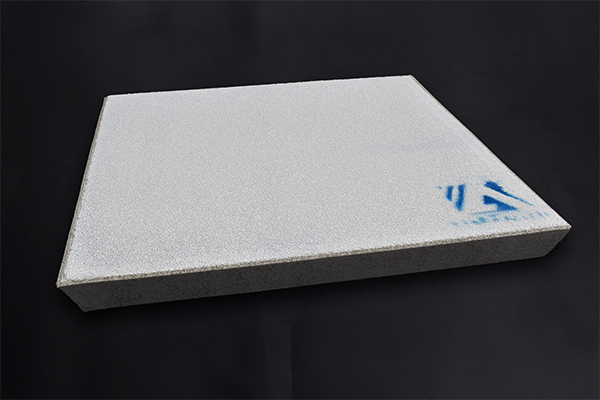Ceramic Filter for Aluminum Smelter can remove any solid inclusions, such as metal oxides, from the molten metal, which may affect the quality of the metal cast.
The molten metal ceramic foam filter defines one or more cavities between the surrounding refractory plates in contact with each other, and each cavity includes a series of holes through which the liquid metal is filtered.
The effectiveness of this filter mainly depends on the diameter of the pores and the number of pores that make up them. The smaller the diameter of the hole, the greater the ability of the filter to prevent small inclusions, and the more effective the filtering effect.
Filter efficiency is related to ceramic foam filter cell size. By carefully controlling cell size within the filter, a more consistent filtration performance can be achieved. Typically, removal efficiency increases as filter cell size and the metal velocity in the filter decrease.
Ceramic Filter for Aluminum Smelter is available in all common sizes: 7″, 9″, 12″, 15″, 17″, 20″, and 23″. We offer the whole range of porosities from PPI 10 up to PPI 60 (PPI = pores per inch). Custom-made cut-to-size filters are also possible.

Alouette is the largest aluminum smelter in the Americas and was founded in Septels, Quebec, Canada. Thanks to the new technology, the Alouette smelter produced more than 620,000 tons of aluminum in 2020, a record output. The previous record was 609.96 million tons set in 2016. As of November last year, the company has invested approximately US$100 million in the use of AP40 aluminum electrolytic cell technology.
The Alouette Aluminum Plant plans to complete the transformation project to convert the anode baking furnace to natural gas this year. This project cost 23 million U.S. dollars, of which two-thirds of the funds were funded by the Quebec government.
Ceramic Filter for Aluminum Smelter has high mechanical strength, chemical stability, and high resistance to thermal shock and liquid metal flow shock even in high temperature environments.
The filter can increase the compression and sealing of the casting, increase the elongation and tensile strength of the casting, improve the surface finish of the casting, improve the fluidity of the molten metal, and increase the filling capacity and replenishing capacity of the melt.

